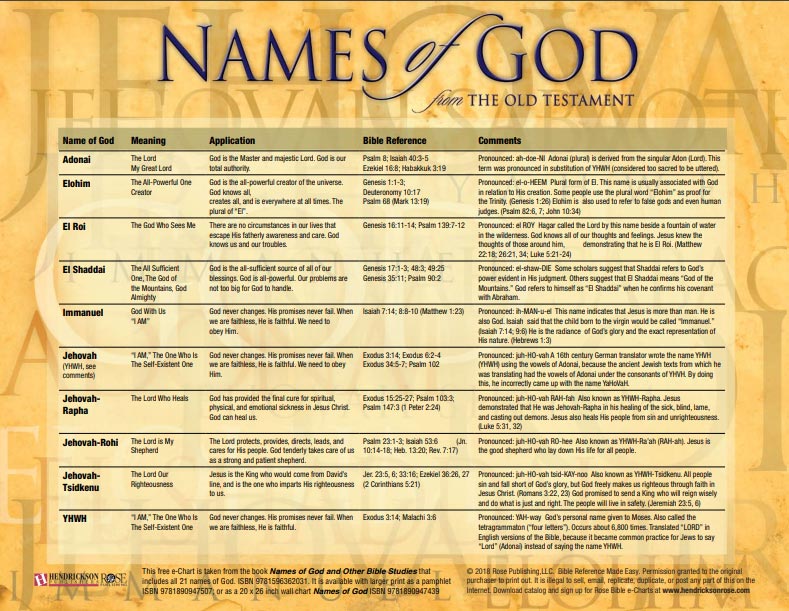Have you ever wondered about the many ways God is described in the Bible? The Hebrew scriptures, often called the Old Testament, are rich with names and titles that reveal different facets of God’s character and attributes. This exploration takes us on a journey through these names, uncovering the diverse ways the Bible presents the Divine. These names aren’t simply labels; they offer a window into our understanding of God’s power, love, and presence in our lives.

Image: quizzmediasophie.z13.web.core.windows.net
Understanding the names of God in the Bible is like getting to know a friend better by learning the different ways they introduce themselves. Each name is imbued with a distinct meaning and significance, reflecting the depths of God’s nature and His relationship with humanity. Whether it’s the majestic Creator, the compassionate Shepherd, or the righteous Judge, these names provide us with a deeper understanding of the Divine and our place within His grand narrative.
The Importance of Names in Scripture
In the ancient world, names held tremendous significance. They were more than just labels; they revealed the essence and purpose of an individual. Across cultures, names represented lineage, character, and destiny. This cultural understanding helps us grasp the importance of God’s names in the Bible. When God speaks of His name, it’s not merely a linguistic identifier; He is revealing the very nature of His Being.
The Most Revered Names
1. YHWH (Yahweh): The Incomprehensible Name
The name that sits at the heart of Jewish faith, YHWH, is known as the Tetragrammaton because it is made up of four Hebrew letters: Yod, He, Waw, and He. This name is considered so sacred that Jewish tradition forbids its verbal pronunciation, substituting it with “Adonai” (Lord). YHWH embodies God’s eternal and unchangeable nature, emphasizing His constant self-existence and power.

Image: davida.davivienda.com
2. Elohim (God): The Mighty Creator
The name “Elohim” is often used to describe God’s power and authority as the ultimate creator. It emphasizes God’s might and His role as the sovereign ruler of the universe. When the Bible depicts God’s acts of creation, it frequently employs the name “Elohim” to underscore His unyielding power and control over all things.
3. Adonai (Lord): The Majestic Sovereign
The term “Adonai” communicates God’s authority and dominion. Often translated as “Lord,” it signifies respect, reverence, and absolute sovereignty over all creation. The use of “Adonai” evokes a sense of awe and acknowledgement of God’s ultimate rule.
Other Significant Names
Beyond these fundamental names, there are many other titles and descriptions of God in the Bible that shed light on His multifaceted nature:
- El Shaddai (God Almighty): Emphasizing God’s power and ability to provide for His people.
- El Elyon (The Most High God): Highlighting God’s absolute supremacy and sovereignty over all other deities.
- El Olam (The Everlasting God): Revealing God’s eternal existence and unchanging nature.
- Jehovah-Jireh (The Lord Will Provide): Expressing God’s faithfulness in supplying all our needs.
- Jehovah-Nissi (The Lord Is My Banner): Underlining God’s protective presence and our reliance on Him for strength.
- Jehovah-Raah (The Lord Is My Shepherd): Depicting God’s loving care and guidance.
- Jehovah-Shalom (The Lord Is Peace): Signifying God’s role as the source of true peace.
- Jehovah-Tsidkenu (The Lord Our Righteousness): Highlighting God’s righteousness and how He provides it for us through faith.
- Jehovah-Mekoddishkem (The Lord Who Makes You Holy): Emphasizing God’s sanctifying work in our lives.
The Importance of Understanding God’s Names
Each of these names unveils a different facet of God’s character, leading us to a deeper understanding of His love, justice, mercy, and power. When we delve into these names, we begin to see God’s attributes as they are expressed in the biblical narrative. The names of God in the Bible offer a rich tapestry of descriptions, allowing us to encounter the Creator in a more personal and multifaceted way.
The Names of God in the New Testament
While the New Testament doesn’t introduce a plethora of new names for God, it continues to explore the significance and implications of those found in the Old Testament. Jesus himself refers to God as “Abba,” a term of endearment that emphasizes God’s fatherly love and intimacy.
The Names of God and Our Relationship With Him
These names are not merely words on a page; they are windows into the very being of God. They shape our understanding of His character and offer a framework for our relationship with Him. When we understand the names of God, we gain a deeper appreciation for His nature and the various ways He interacts with His creation.
What Are The 100 Names Of God In The Bible
Conclusion: A Deeper Understanding
The names of God in the Bible are more than just labels; they are keys to understanding His multifaceted nature and the depth of His relationship with humanity. As we explore these names, we are invited into a deeper understanding of the Divine and our place within His grand narrative. Let this journey through God’s names inspire you to delve further into His Word, uncovering the immeasurable depth and wonder of His Being.






